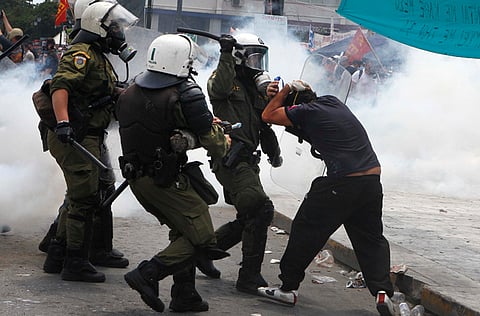Europe's elite could be next on the list
Protesters in Greece know that the country's solvency crisis inherently poses survival issues for the entire Eurozone

I shouldn't really say this," my interlocutor, a key member of the Greek parliamentary left says, "but we need a Chirac. Where is De Gaulle? Where is Chirac. Where is the leadership going to come from to get us out of this?"
The question goes to the heart of the way Greeks see the crisis: now their austerity plan has passed in parliament, the absence of strategy at a Eurozone level is where the risk lies.
The austerity package buys immediate respite in the form of a ¤12billion (Dh64.8 billion) tranche of bailout money. But without honest answers to the question of how much Greek debt is to be written off, and by whom, the threat of a chaotic downfall will be ever present.
As I have pushed my way through the rioting throngs these past two weeks, there has been an insistent theme to the comments: "This is coming to you: you're next. Italy, Britain, America everybody's in the same condition."
Technically this is not true: Greek debt is junk, governance is teetering, popular morale close to broken. But while markets will only insure Greek debt for 60 per cent of its value, the threat of even the slightest downgrade for Britain or the US remains just that, a threat.
But it has dawned on me, scurrying through clouds of tear gas and slipping on blood, that the protesters are on to a bigger point. The governance dysfunction we see in Greece is replicated at a higher level in Europe; and the solvency threat in Greece does pose survival-level issues for the currency itself.
Crisis of consent
Elena Panaritis, one of the western-educated lawmakers guiding the Greek prime minister, insists the Eurozone authorities have played this badly: "Through indecision they turned an issue of long-term structural reform into an issue of short-term insolvency," she says.
"As a result the austerity last week cannot in any way be cathartic nor can it be sold as such, whatever short-term euphoria it has produced in Brussels. We need to deliver a productive economy, with an entrepreneurial culture, that exports. Europe needs to create a quick reaction system," Panaritis says.
But what Europe shares with the Greek political class is a crisis of top-level vision, execution and consent. The elite in Athens, one eminent local commentator admits freely, "has always floated above the people. But nobody minded. They got rich, we got rich. We never cared that they were unaccountable. But now they're still floating up there, adrift, separate from the people: but everybody's getting poorer."
Last week's clashes in the streets around Syntagma Square brought a new intensity not just to the violence, but to this crisis of consent. The ‘indignados' camped out there for more than a month now have had time to move on from their initial ‘anti-politics'.
What's out there now is an amalgam of nationalism, anarchism and introspection. It is hard, even among the organised leftists who have been there since day one, to find optimism: "We're just facing two routes to bankruptcy," one told me.
Firing tear gas at thousands of largely peaceful protesters forcing old people to stagger blindly through projectile-laden space, gasping for breath seemed like a final, calculated act of bad faith to those on the receiving end.
As they crowded around my camera they shouted out their professions as a kind of valediction: "I'm an interior designer, sales rep, bank clerk ... I'm a classical pianist and I studied at the Royal Academy!"
Dictatorship
The same kind of people clustered around TV screens in the Plaka district, just off the square, as the parliamentary votes were cast. Some had their faces in their hands, others zoned out with the gas and anger just did that ancient hex-curse thing with open hands that has become the new clenched fist of the opposition movement. They were oblivious to the stone-throwing and burning barricades a few yards away.
Many of the small businesses that line these streets are doomed: the small specialist shops that sell only maps, or sheet music, or one kind of handbag proclaim the Greek version of freemarket capitalism. They've survived because the tax they pay is minimal.
But if you lose the middle classes in an economy like this, then the outcomes that secretly haunt the minds of the doomladen left begin to be spoken of. "Democracy is not at risk," says Antonis Papayiannidis, a lawyer and political columnist, "but if you now get people who are petit bourgeois, plus people who are barely above the poverty level, and they get furious, staging mob resistance — nobody has seen this play acted out. Or rather, they have seen it, in Germany in the 1920s and that was nasty."
It is not the spectre of dictatorship that haunts the centrist politicians, but despair at hearing perfectly rational people describe Greek democracy as already a dictatorship. When you hear such rhetoric from a youth in a balaclava, it is one thing. When the protesters are wearing Gucci sunglasses it is, and should be, a mind-focuser for the political elite of Europe.
Because unless somebody gets a grip and the French voluntary debt rollover plan is now understood as merely a stopgap, the Gucci-eyewear classes of northern Europe are equally capable of reacting to zone-wide crisis. They will not riot, nor will they need to: they may simply withdraw electoral consent for the deal at the heart of the euro project.
Paul Mason is Newsnight's economics editor.
Sign up for the Daily Briefing
Get the latest news and updates straight to your inbox



